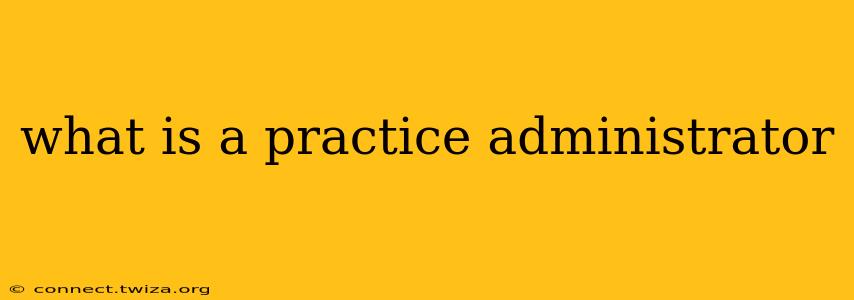A practice administrator, often called a medical practice administrator or office manager in smaller settings, is the unsung hero of healthcare. They're the glue that holds a medical practice together, ensuring smooth operations and efficient patient care. This isn't just about scheduling appointments; it's about strategic management, financial oversight, and fostering a positive work environment. Let's delve deeper into their multifaceted role.
What are the Responsibilities of a Practice Administrator?
The day-to-day responsibilities of a practice administrator are diverse and demanding. They can be broadly categorized into:
Administrative Tasks:
- Scheduling and Appointment Management: This involves optimizing appointment scheduling to maximize efficiency, managing patient flow, and ensuring minimal wait times. They may utilize scheduling software and oversee the reception staff.
- Human Resources: Recruiting, hiring, training, and managing staff falls under their purview. This includes ensuring compliance with employment laws and fostering a positive team dynamic.
- Financial Management: This critical area involves budgeting, billing, accounts payable and receivable, insurance claims processing, and managing the practice's overall financial health. They often work closely with accountants and billing specialists.
- Compliance and Regulations: Staying up-to-date with HIPAA regulations, OSHA guidelines, and other relevant healthcare laws is crucial. They ensure the practice remains compliant and avoids potential penalties.
- Office Management: Overseeing the daily operations of the office, including maintenance, supplies, and equipment, is vital for a smooth-running practice.
Strategic Tasks:
- Strategic Planning: Practice administrators play a key role in the long-term strategic planning of the medical practice. This involves identifying growth opportunities, analyzing market trends, and developing strategies to improve efficiency and profitability.
- Technology Management: Implementing and managing electronic health records (EHRs), practice management software, and other technologies to improve efficiency and patient care.
- Marketing and Patient Relations: They may be involved in marketing initiatives to attract new patients and improve patient satisfaction. This can include managing the practice's online presence and handling patient feedback.
What Skills Does a Practice Administrator Need?
The role demands a unique blend of hard and soft skills:
- Leadership and Management Skills: Effectively leading and motivating a team is crucial.
- Organizational and Time Management Skills: Juggling multiple responsibilities requires exceptional organizational abilities.
- Financial Acumen: Understanding financial statements, budgeting, and billing processes is essential.
- Communication and Interpersonal Skills: Excellent communication skills are necessary for interacting with patients, staff, and other healthcare professionals.
- Problem-Solving Skills: The ability to quickly and effectively solve problems is critical.
- Technical Skills: Proficiency with various software programs, including EHRs and practice management software.
- Knowledge of Healthcare Regulations: A strong understanding of HIPAA and other relevant regulations.
What's the Difference Between a Practice Manager and a Practice Administrator?
The terms "practice manager" and "practice administrator" are often used interchangeably, particularly in smaller practices. However, in larger organizations, a "practice administrator" might oversee multiple practice managers, each responsible for specific departments or locations. The administrator holds a more senior and strategic role, focusing on overall practice performance and growth.
How Much Does a Practice Administrator Make?
Salary varies depending on location, experience, and the size of the practice. However, you can expect a competitive salary reflecting the demanding nature of the role. Researching salary data for your specific geographic location will provide a more accurate estimate.
What Education and Experience are Needed to Become a Practice Administrator?
While formal education requirements vary, a bachelor's degree in healthcare administration, business administration, or a related field is highly beneficial. Experience in a healthcare setting is also crucial, with progressive roles leading to administrative responsibilities.
This comprehensive overview should provide a clear understanding of the diverse and crucial role of a practice administrator in the success and efficiency of any medical practice.
